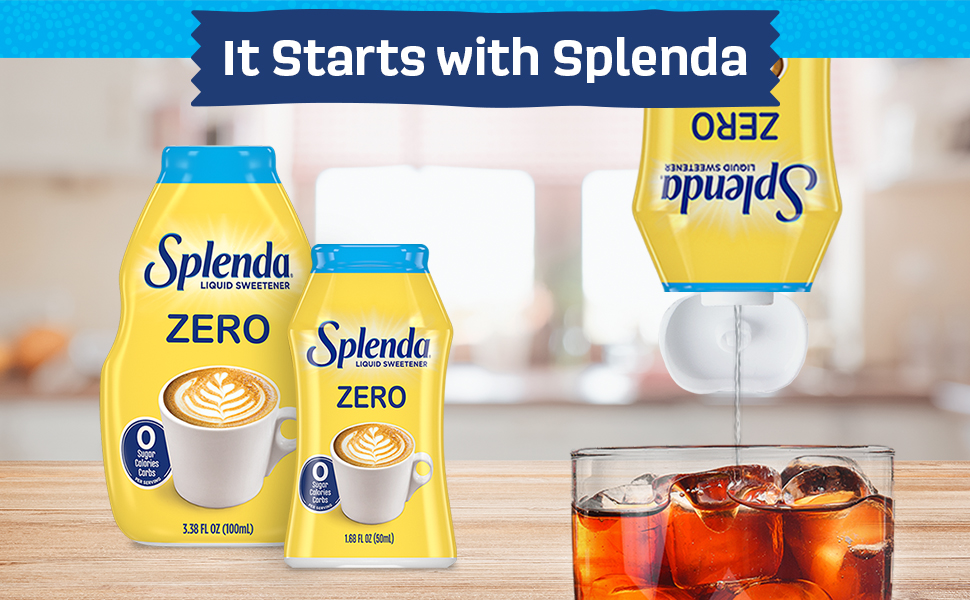Our friends at Splenda have done it again! They’ve made it possible to indulge in a taste of Summer without guilt. Enjoy this Watermelon Mojito Mocktail recipe by Splenda.
Ingredients
4 cubes of fresh watermelon
4 mint leaves
1/2 teaspoon of Splenda Liquid Sweetener
1 ounce lime juice
5 ounces of lime seltzer water
Instructions
Add watermelon, mint leaves, and Splenda Liquid Sweetener to a cocktail shaker and muddle to release the juices.
Add lime juice and ice and shake until chilled.
Strain over ice-filled glass. Top with lime seltzer water.
Garnish with a watermelon slice and fresh mint.
Get nutritional information and more great recipes at Splenda!
What is A Mocktail?
A mocktail is a cocktail-style beverage made without alcoholic ingredients. It’s an elevated version of the standard non-alcoholic drink. It’s also crafted with sodas, juices, herbs, syrups, and the same mixology methods and tools used for regular mixed drinks. The final product is a non-alcoholic beverage that should be enjoyed and savored, just like a well-mixed cocktail.
Alcohol and Diabetes
Many people with diabetes enjoy an alcoholic beverage. But when drinking alcohol is combined with the medications most often used to treat diabetes—particularly insulin and sulfonylureas, low blood sugar (hypoglycemia) can result. While a glass of wine with dinner probably isn’t a big deal, two mojitos on an empty stomach at happy hour is.
Ironically, several symptoms of hypoglycemia—such as slurred speech, drowsiness, confusion, or difficulty walking—are also symptoms of being drunk; it can be difficult to tell the two apart. And if you often have hypoglycemia unawareness, a condition you don’t recognize you’re going low, drinking becomes especially dicey. Timing may also be an issue, as hypoglycemia can strike hours after your last drink, especially if you’ve been exercising.
What Exactly is Moderate Drinking?
It’s one drink daily for women and up to two per day for men. However, that “drink” is much smaller than some think, just five ounces of wine, a 12-ounce beer, or one and a half ounces of 80-proof spirits.
The information above is not a strict and steadfast rule. There are no universal guidelines for drinking alcohol for people with diabetes. Talk to your doctor about your drinking habits and seek their help developing your guidelines.
Alcohol and Blood Pressure
High blood pressure is linked to diabetes. Over time, mismanaged diabetes damages the small blood vessels, causing the walls of the blood vessels to stiffen and malfunction. These changes contribute to high blood pressure.
Drinking too much alcohol can raise blood pressure to unhealthy levels. Having more than three drinks in one sitting temporarily raises blood pressure. Repeated binge drinking can lead to long-term increases in blood pressure.
What is Splenda ZERO Liquid Sweetener?
Splenda ZERO Liquid Sweetener has zero calories and dissolves easily in hot and cold beverages, sauces, glazes, and more. Its convenient size makes it easy to take with you anywhere, and its leak-free flip-top lid means no mess when you toss it in your purse, backpack, or briefcase Splenda delivers a variety of great-tasting solutions to help you achieve a healthy, balanced lifestyle without sacrificing taste.
We’re discussing healthy lifestyle swaps for people with diabetes on this episode of Divabetic’s podcast.
With a few simple swaps, you can help live your best life while managing your diabetes. Our experts offer straightforward, simple, and fun swap ideas for drinks, medications, self-care, and fashion. Plus, we share style tips and words of inspiration to help you maintain a healthy habit.
Developing these habits isn’t always easy. Adapting to a new routine can be tricky, and it’s often tempting to want to return to old ways if we don’t see immediate results. One of the biggest mistakes people make when forming a new habit is taking on too much too quickly. Focus on what’s working in your diabetes self-care plan before overhauling diabetes management. Instead of decluttering the entire house, why not focus on one room or closet? Why not focus on the calories you drink rather than everything you eat? If you want to eat healthier, try replacing one dessert daily with a piece of fruit rather than cutting out sugar completely. If you’re going to get into hiking, start with a walk at lunchtime. Setting small goals you can achieve will help keep you motivated along the way.
Guests include Catherine Schuller, Poet Lorraine Brooks, Patricia Addie-Gentle RD, CDCES, MaryAnn Horst Nicolay, MEd, NDTR, and Mama Rose Marie. Hosted by Mr. Divabetic.
Need a Summer tune?
Kylie Minogue has taken over the airwaves in my home with this catchy song!! Add it to your workout tape.




